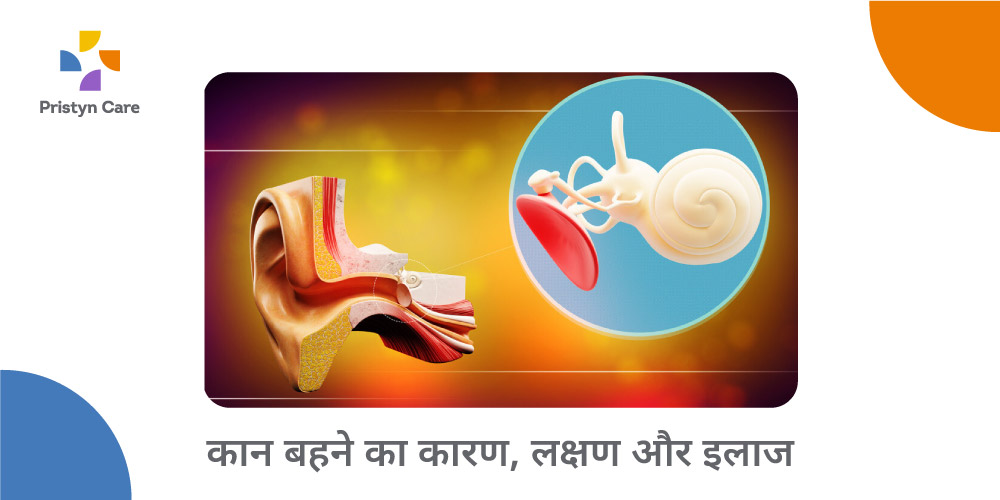Ear discharge: causes, treatment, prevention

Ear discharge can be caused by several types of infections or injuries. This blog will determine the causes, symptoms and best treatment for ear discharge.
What is ear discharge?
Ear discharge is the presence of fluid or pus in the ear canal. It is a common problem that can occur in both adults and children. Depending on the cause, ear discharge may be clear, yellow, bloody, or viscous.
Determining the cause of ear discharge is important to properly treating the problem. Common causes of ear discharge include infections, trauma, and foreign bodies in the ear canal. In most cases, this problem can be resolved with antibiotics or other drugs. Rarely, surgery may be needed to remove a foreign body or treat an infection.
What causes ear discharge?
Ear discharge is common and can be caused by a variety of reasons, including:
Infection: Infection is the most common cause of ear discharge. Bacterial infections of the ear can cause yellow or greenish pus-filled discharge, an odor, and itching, pain, redness, and swelling. Fungal infections, on the other hand, cause an odorless, white cottage cheese-like discharge that can cause itching, pain, and redness.
Earwax buildup: Clogging the ears with accumulated wax, debris, or foreign objects can also cause discharge. This type of blockage causes fluid to build up behind the eardrum and can release secretions from the eardrum. The discharge may be clear, white, or yellow and may be itchy, painful, or have other symptoms.
trauma: A traumatic injury to the ear may cause blood or bloody discharge. This type of ear discharge may result from a tear in the ear canal, a ruptured eardrum, or an ear injury.
Dust allergy: Allergies can also cause ear discharge. This type of discharge is usually clear and odorless and may cause itching and pain in the ears. Chemical reactions, such as those that occur with certain types of ear drops, can also cause discharge.
Treatment of ear discharge should always be performed by an experienced ear, nose and throat surgeon to determine the underlying cause. and best treatment.
What are the red flags of ear discharge?
Ear discharge is a symptom common to various conditions ear disease It is usually caused by fluid buildup in the middle ear. It’s important to be aware of the red flags of ear discharge because it can indicate a more serious health condition that requires medical attention.
Common warning signs of ear discharge include a feeling of fullness or pressure in the ear, muffled noise, ringing in the ear, discharge from the ear, pain or itching in the ear, and foul odor from the ear. If you have these symptoms, it’s best to see your doctor as soon as possible.
Sudden hearing loss may be a sign of hearing loss due to ear discharge. Additionally, if you feel dizzy or dizzy, it could also be caused by fluid buildup in your ears.
If you have warning signs of ear discharge, it’s best to see a doctor. Early diagnosis and treatment can help reduce the risk of long-term complications.
What is ear discharge diagnosis and treatment?
Diagnosing ear discharge includes an exam of the eardrum and a hearing test. Depending on the cause of the discharge, additional tests may be needed to determine the exact cause. These tests may include ear imaging scans, CT scans, or secretions samples sent to a lab for further examination.
If an infection is present, treatment is usually with antibiotics or antifungals. If ear discharge is caused by an underlying disorder such as an autoimmune disease or a tumor, treatment of the underlying cause may be necessary.
It is important to see a doctor if you have ear discharge because early diagnosis and treatment can help prevent serious complications.
In severe cases, doctors may suggest surgical treatment, depending on the underlying cause of the discharge.

How to prevent ear discharge?
Ear discharge can be an uncomfortable and worrying problem. However, there are ways to prevent that. Here are some tips to prevent ear discharge.
- Do not put anything in your ears. This includes swabs, fingers and other objects. This can push earwax further into the ear canal and cause a blockage.
- Clean the outside of your ears regularly. Use a towel dampened with warm water to gently wipe around the ear. Do not use cotton swabs to clean your ears.
- Use a humidifier in your bedroom to keep your ears moist. This helps the earwax move more easily and prevents it from becoming too thick and clogging.
- Avoid swimming in water that is contaminated with bacteria or other organisms. These can enter the ear canal and cause an infection.
- Avoid using earplugs or headphones that are too tight or cause discomfort. These can push earwax further into the ear canal, causing a blockage.
- Have your ears checked regularly by a doctor. This will help identify the underlying problem that may be causing the ear discharge.
By following these tips, you can prevent ear discharge and keep your ears healthy and functioning properly.
post Ear discharge: causes, treatment, prevention first appeared in pristine care.
https://www.pristyncare.com/blog/ear-discharge-causes-treatments-and-prevention/ Ear discharge: causes, treatment, prevention


